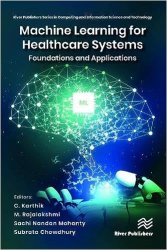Machine Learning for Healthcare Systems: Foundations and Applications
- Добавил: literator
- Дата: 27-07-2023, 14:54
- Комментариев: 0
 Название: Machine Learning for Healthcare Systems: Foundations and Applications
Название: Machine Learning for Healthcare Systems: Foundations and ApplicationsАвтор: C. Karthik, M. Rajalakshmi, Sachi Nandan Mohanty
Издательство: River Publishers
Год: 2023
Страниц: 251
Язык: английский
Формат: pdf (true)
Размер: 25.7 MB
This book provides various insights into Machine Learning techniques in healthcare system data and its analysis. Recent technological advancements in the healthcare system represent cutting-edge innovations and global research successes in performance modelling, analysis, and applications. The extensive use of machine learning in numerous industries, including healthcare, has been made possible by advancements in data technologies, including storage capacity, processing capability, and data transit speeds. The need for a personalized medicine or ""precision medicine"" approach to healthcare has been highlighted by current trends in medicine due to the complexity of providing effective healthcare to each individual.
Personalized medicine aims to identify, forecast, and analyze diagnostic decisions using vast volumes of healthcare data so that doctors may then apply them to each unique patient. These data may include, but are not limited to, information on a person's genes or family history, medical imaging data, drug combinations, patient health outcomes at the community level, and natural language processing (NLP) of pre-existing medical documentation.
Machine Learning methods can be broadly classified into two major groups, namely supervised and unsupervised learning. Supervised learning makes use of labeled data to learn, where the mapping function may be seen to be of the form Y = f (X), indicating that the output is generated accurately for a given, new input data. On the other hand, unsupervised learning uses data that are neither classified nor labeled. The ML algorithm must be able to act on these data without any guidance.
In the recent years, wearable devices or simple wearables are becoming immensely popular and are finding applications in smartphones, smart watches, or even in apparels. The major advantage is that the typically MEMS-based sensor is small, consumes less power, and fits easily in any battery-powered device. These devices are aimed to sense various physiological activities of the subject and then produce meaningful data for further processing.
The introduction of digital technology in the healthcare industry is marked by ongoing difficulties with implementation and use. Slow progress has been made in unifying different healthcare systems, and much of the world still lacks a fully integrated healthcare system. The intrinsic complexity and development of human biology, as well as the differences across patients, have repeatedly demonstrated the significance of the human element in the diagnosis and treatment of illnesses. But as digital technology develops, healthcare providers will undoubtedly need to use it more and more to give patients the best treatment possible.
Скачать Machine Learning for Healthcare Systems: Foundations and Applications
Внимание
Уважаемый посетитель, Вы зашли на сайт как незарегистрированный пользователь.
Мы рекомендуем Вам зарегистрироваться либо войти на сайт под своим именем.
Уважаемый посетитель, Вы зашли на сайт как незарегистрированный пользователь.
Мы рекомендуем Вам зарегистрироваться либо войти на сайт под своим именем.
Информация
Посетители, находящиеся в группе Гости, не могут оставлять комментарии к данной публикации.
Посетители, находящиеся в группе Гости, не могут оставлять комментарии к данной публикации.
